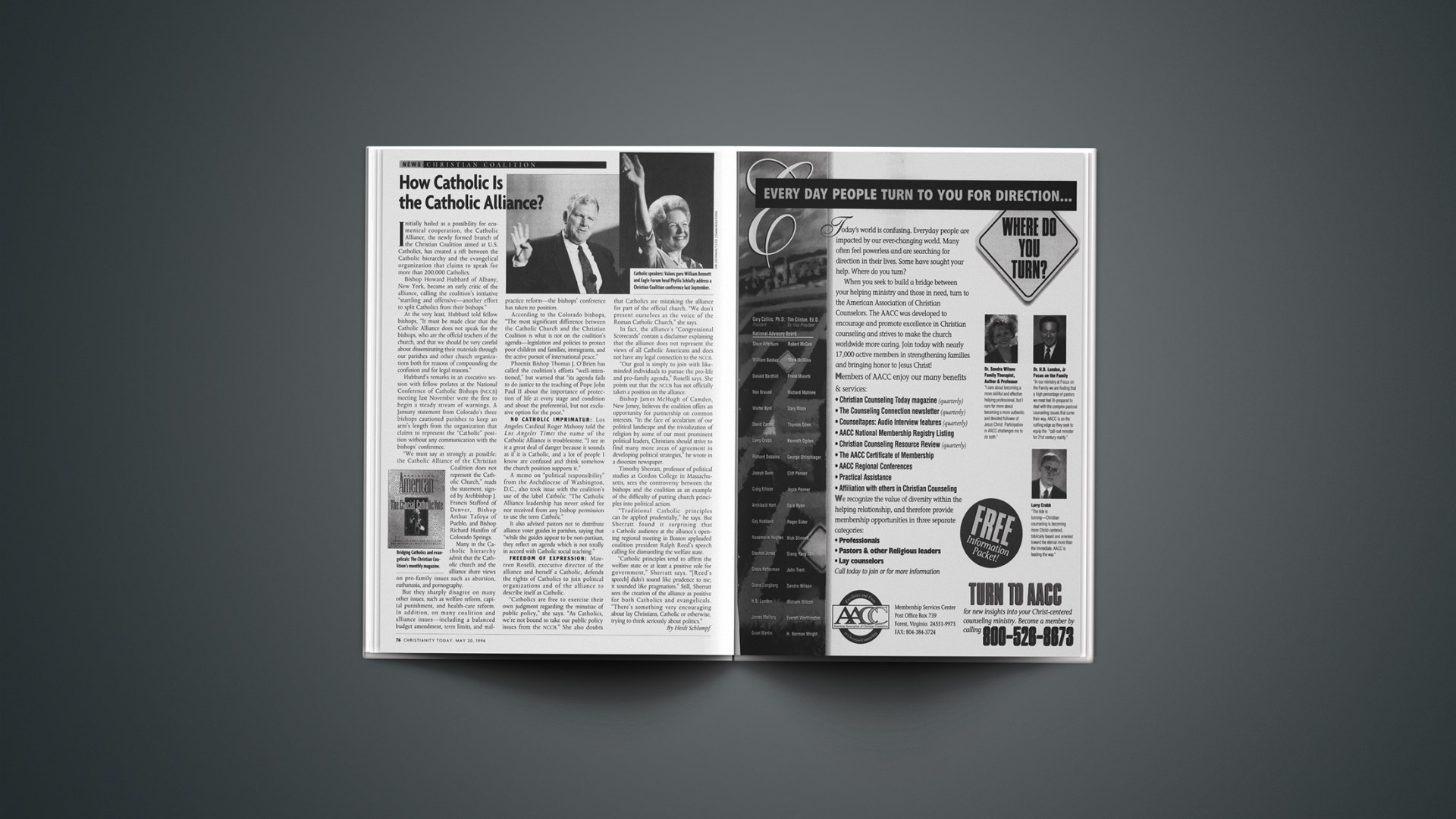Initially hailed as a possibility for ecumenical cooperation, the Catholic Alliance, the newly formed branch of the Christian Coalition aimed at U.S. Catholics, has created a rift between the Catholic hierarchy and the evangelical organization that claims to speak for more than 200,000 Catholics.
Bishop Howard Hubbard of Albany, New York, became an early critic of the alliance, calling the coalition’s initiative “startling and offensive–another effort to split Catholics from their bishops.”
At the very least, Hubbard told fellow bishops, “It must be made clear that the Catholic Alliance does not speak for the bishops, who are the official teachers of the church, and that we should be very careful about disseminating their materials through our parishes and other church organizations both for reasons of compounding the confusion and for legal reasons.”
Hubbard’s remarks in an executive session with fellow prelates at the National Conference of Catholic Bishops (NCCB) meeting last November were the first to begin a steady stream of warnings. A January statement from Colorado’s three bishops cautioned parishes to keep an arm’s length from the organization that claims to represent the “Catholic” position without any communication with the bishops’ conference.
“We must say as strongly as possible: the Catholic Alliance of the Christian Coalition does not represent the Catholic Church,” reads the statement, signed by Archbishop J. Francis Stafford of Denver, Bishop Arthur Tafoya of Pueblo, and Bishop Richard Hanifen of Colorado Springs.
Many in the Catholic hierarchy admit that the Catholic church and the alliance share views on pro-family issues such as abortion, euthanasia, and pornography.
But they sharply disagree on many other issues, such as welfare reform, capital punishment, and health-care reform. In addition, on many coalition and alliance issues–including a balanced budget amendment, term limits, and malpractice reform–the bishops’ conference has taken no position.
According to the Colorado bishops, “The most significant difference between the Catholic Church and the Christian Coalition is what is not on the coalition’s agenda–legislation and policies to protect poor children and families, immigrants, and the active pursuit of international peace.”
Phoenix Bishop Thomas J. O’Brien has called the coalition’s efforts “well-intentioned,” but warned that “its agenda fails to do justice to the teaching of Pope John Paul II about the importance of protection of life at every stage and condition and about the preferential, but not exclusive option for the poor.”
NO CATHOLIC IMPRIMATUR: Los Angeles Cardinal Roger Mahony told the Los Angeles Times the name of the Catholic Alliance is troublesome. “I see in it a great deal of danger because it sounds as if it is Catholic, and a lot of people I know are confused and think somehow the church position supports it.”
A memo on “political responsibility” from the Archdiocese of Washington, D.C., also took issue with the coalition’s use of the label Catholic. “The Catholic Alliance leadership has never asked for nor received from any bishop permission to use the term Catholic.”
It also advised pastors not to distribute alliance voter guides in parishes, saying that “while the guides appear to be non-partisan, they reflect an agenda which is not totally in accord with Catholic social teaching.”
FREEDOM OF EXPRESSION: Maureen Roselli, executive director of the alliance and herself a Catholic, defends the rights of Catholics to join political organizations and of the alliance to describe itself as Catholic.
“Catholics are free to exercise their own judgment regarding the minutiae of public policy,” she says. “As Catholics, we’re not bound to take our public policy issues from the nccb.” She also doubts that Catholics are mistaking the alliance for part of the official church. “We don’t present ourselves as the voice of the Roman Catholic Church,” she says.
In fact, the alliance’s “Congressional Scorecards” contain a disclaimer explaining that the alliance does not represent the views of all Catholic Americans and does not have any legal connection to the nccb.
“Our goal is simply to join with like-minded individuals to pursue the pro-life and pro-family agenda,” Roselli says. She points out that the NCCB has not officially taken a position on the alliance.
Bishop James McHugh of Camden, New Jersey, believes the coalition offers an opportunity for partnership on common interests. “In the face of secularism of our political landscape and the trivialization of religion by some of our most prominent political leaders, Christians should strive to find many more areas of agreement in developing political strategies,” he wrote in a diocesan newspaper.
Timothy Sherratt, professor of political studies at Gordon College in Massachusetts, sees the controversy between the bishops and the coalition as an example of the difficulty of putting church principles into political action.
“Traditional Catholic principles can be applied prudentially,” he says. But Sherratt found it surprising that a Catholic audience at the alliance’s opening regional meeting in Boston applauded coalition president Ralph Reed’s speech calling for dismantling the welfare state.
“Catholic principles tend to affirm the welfare state or at least a positive role for government,” Sherratt says. “[Reed’s speech] didn’t sound like prudence to me; it sounded like pragmatism.” Still, Sherratt sees the creation of the alliance as positive for both Catholics and evangelicals. “There’s something very encouraging about lay Christians, Catholic or otherwise, trying to think seriously about politics.”
Copyright © 1996 Christianity Today. Click for reprint information.










